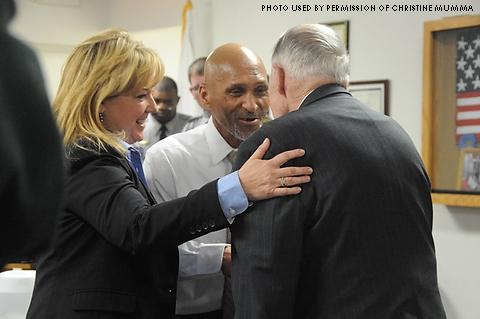On Friday, January 23, 2015, Joseph Sledge walked free from prison after 36 years behind bars.
In 1978, Sledge was convicted of a murder he did not commit. He maintained his innocence the entire time he was in prison, and eventually caught the attention of the North Carolina Center on Actual Innocence (NCCAI). The Center investigated his case and decided to take it on. Ten years later, he is walking free.
Sledge’s lawyer, Christine Mumma, is the executive director of the NCCAI. Mumma helped find the evidence that set Sledge free.
The North Carolina Center on Actual Innocence strives to help as many wrongly accused and convicted people that they can. The Center also works with the Innocence Project, a national organization with the same mission. To date, The Innocence Project and the North Carolina Center on Actual Innocence have freed 326 people through DNA evidence. Eleven of those cases have been in North Carolina.
The NCCAI reviews inmate claims, as well as claims from other people.Claims must be reliable and supported by evidence. Most of the cases are overturned using DNA. Some cases are also proved through proof of unreliable witnesses, as well as events such as false confessions.
Mumma herself became interested in this line of work when she was a clerk at the North Carolina Supreme Court. “I guess the real turning point was when I clerked at the Appellate Courts and I learned about the limits of appellate review…that’s when I saw a couple of cases when I saw concerns about innocence,” said Mumma. In other words, innocent people can lose their appeals and stay in prison, unless someone is willing to do further investigation.
It seems hard to believe that innocent people can end up in prison, but it’s possible.
“There [are] some common factors, misidentification , false confessions, false informant testimony, you can have a case that has all three, faulty forensic science, misconduct… ineffective assistance of counsel–some defense attorneys can provide ineffective help,” said Mumma.
As well as helping release innocent people from prison, the NCCAI and the Innocence Project also work to reform policy that will help prevent innocent people from being convicted in the first place.
The NCCAI helped to pass legislation about how police line ups are performed and how interrogations are reported. For example, there must be visual and audio recording of interrogations in North Carolina. Police lineups have to comply with guidelines so they are not too suggestive. If an eyewitness described a suspect as blonde, the police could not put four brunettes in a line up with a blonde suspect.
Sometimes, suspects are forced or tricked into confessing by the police or other law officials. That was what happened in the case of Henry Lee McCollum and Leon Brown. The two men were released on Wednesday, September 2 2014 from death row after being wrongfully convicted of a rape and murder. Both had been in prison for 31 years, and both were mentally handicapped.
Before starting the NCCAI, Mumma worked with the state legislature and Chief Justice I. Beverly Lake Jr. to create the North Carolina Innocence Inquiry Commission. McCollum and Brown were freed thanks to the work of that agency, which investigated the case and identified DNA pointing to another man as the actual killer. Brown and McCollum were represented by lawyers from the Center for Death Penalty Litigation. Even though Mumma was not directly involved in the case, her work in the past helped lead to the mens’ freedom.
While working with prisoners can be hard, it can also be rewarding. Mumma believes that her most rewarding case was the Joseph Sledge case. “I worked on it for 10 years; when something takes that long, it’s very rewarding when it’s resolved,” said Mumma.
Mumma offers advice to students interested in the law. While everyone may not decide to start in the criminal line of work, there is always an opportunity to begin.
“A legal education is a great education regardless of what area you go into. There is always an opportunity to help people who are indigent no matter what kind of law you go into, even corporate law,” said Mumma.
In its lifetime, the NCCAI has caused the courts to release six innocent people from prison. Six may seem like a small number, but releasing that many innocent people is a big accomplishment for Mumma and the people who work with her.

Leave a Reply